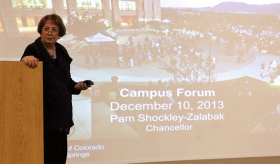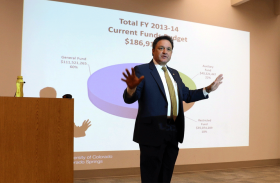Program prioritization, budget discussions dominate forum
Chancellor Pam Shockley-Zalabak explains details of program prioritization during a Dec. 10 forum. (Photo: Thomas Hutton/University of Colorado)
With a backdrop of some of the best state government budget news in a decade, Chancellor Pam Shockley-Zalabak outlined a UCCS process for program prioritization report during a Dec. 10 all-campus forum.
Shockley-Zalabak emphasized that faculty and staff will be included in a comprehensive, data-intensive review of all degree-granting and non-degree-granting programs. The processes will be different, though similar, in that there will be multiple levels of reviews and broad consultation with departments and units. She also emphasized the goal of the reviews is not to eliminate programs or positions.
“The fundamental structure of funding public higher education is changing,” Shockley-Zalabak said. “If we do not begin to look at what we do, and how we allocate our resources, we will not be able to be financially sustainable with excellence in the future.”
While the CU Board of Regents-directed program prioritization effort is new, Shockley-Zalabak emphasized that reviewing processes and looking for improvement is not. Funding cuts and enrollment growth in the last decade have required UCCS to operate carefully and plan accordingly. Program Prioritization is a process that builds on the efforts of the past several years and looks toward the future.
There are 56 degree-granting and 58 non-degree-granting programs that will be evaluated during the spring semester. Data points will vary between the two groups but will revolve around information that is already collected and available. Examples cited included financial sources and uses statements, number of students, number of faculty, number of staff, numbers of majors, students enrolled, graduation rates and student pass rates on professional exams.
Brian Burnett, senior executive vice chancellor, Administration and Finance explains details of the UCCS budget during a Dec. 10 forum. (Photo: Thomas Hutton/University of Colorado)
The final metrics are under discussion and data collected will be reviewed by departments for accuracy prior to submission. Departments will also be expected to provide a narrative about the challenges they face, how they connect to the UCCS Strategic Plan, undeveloped opportunities and future direction. The final product will be evaluated by multiple levels of teams that include a cross-section of campus. Staff and faculty governance groups will be asked to nominate individuals to serve on review committees prior to final review by the campus leadership team. The committees will be active early in the spring semester with the goal of producing a report for the April regents meeting.
Brian Burnett, senior executive vice chancellor, Administration and Finance explains details of the UCCS budget during a Dec. 10 forum.
Budget Outlook
Before the discussion of program prioritization, Brian Burnett, senior executive vice chancellor, Administration and Finance, provided an overview of the $187 million campus budget and preliminary recommendations by Gov. John Hickenlooper. In Colorado, the governor recommends budget allocations to members of the Joint Budget Committee, which prepares an appropriation bill for vote by the Colorado General Assembly.
Though early in the process, Burnett highlighted Hickenlooper recommendations for increased funding to higher education including an 11 percent increase in operating funds, increases in student financial aid and merit scholarships, salary increases for classified staff members and funding for a Visual and Performing Arts building on North Nevada Avenue. Tuition increases are expected to be less than 6 percent.
“The state is recovering, despite flooding, rain, hail, fires, everything,” Burnett said.
Related articles:
Governor’s budget proposal leaves chancellor cautiously optimistic
Expanded budget reviews begin program prioritization process



